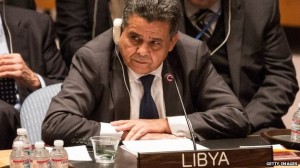By Libya Herald staff.

Tripoli, 27 March 2015:
The formation of a national unity government is the most important objective of the national . . .[restrict]dialogue and will be the foundation upon which Libya builds its future, Libyan Foreign Minister Mohamed Al-Dairi told reporters at the Arab Summit in Sharm Al-Sheikh.
Indeed, the United Nations Security Council has made it quite clear that it has no intention of lifting the 2011 arms embargo—which the Libyan government feels is desperately needed if it is to push out the Islamic State (IS)—until such a government is formed in Libya.
The governments of Egypt and Saudi Arabia have lobbied for a lift of the embargo, but the EU, UK and US have been hesitant to allow more weapons to flow into the country, saying they fear they will fall into the hands of extremists or be used by the rival governments to fight one another.
At the Arab Summit in Egypt’s Sharm Al-Sheikh, which started Thursday, Egyptian Foreign Minister Sameh Shoukri said that the Arab League supports the House of Representatives (HoR) as Libya’s legally elected parliament and that the League as a whole was in agreement in their support of it.
Egypt, the UAE and Saudi Arabia have been ready and willing to intervene for months, and it is widely believed that the countries have supported the Libyan National Army (LNA) and Khalifa Hafter’s Operation Dignity with warplanes in their fight against Libya Dawn.
The release by IS of a video in January of the beheading of 20 Egyptian Coptic Christians was all it took to give Egyptian president Abdel Fattah Al-Sisi reason to openly unleash a barrage of airstrikes on the IS stronghold of Derna in retaliation.
With Thursday’s resolution by those present in Sharm Al-Sheikh, Egypt, Saudi Arabia and their allies are moving closer than ever to creating a joint Arab military force—a longtime goal that has eluded Arab nations in the 65 years since they signed a defense pact—to intervene in regional hotspots like Libya.
Sisi has said that there was a pressing need now for a joint Arab force and that Egypt was prepared to intervene militarily to support its allies.
“The resolution sends a clear message that Arab nations can agree on a plan to defend themselves,” said Arab League chief Nabil El-Araby at a press conference in Sharm Al-Sheikh on Thursday.
Furthermore, the resolution will allow for future actions, such as those carried out by Egypt, the UAE and Saudi Arabia, to be carried out under the cover of the Arab League. [/restrict]






